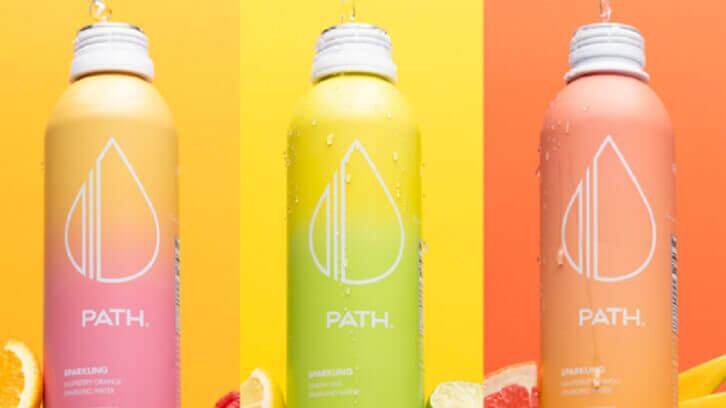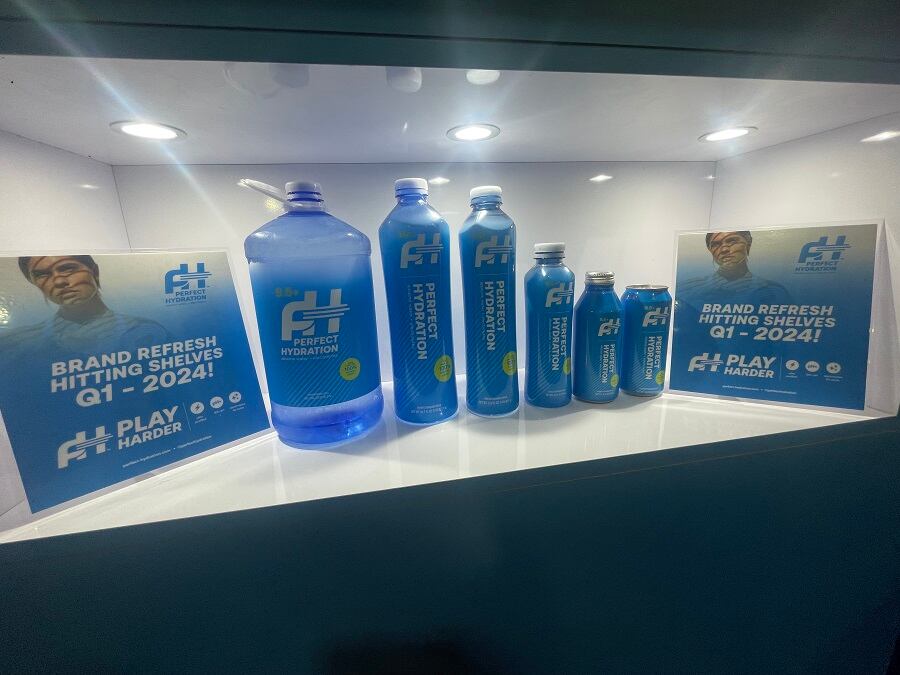Honing in on the growing demand for sustainable packaging within a competitive market, Bakour emphasized the need for brands to prioritize reusability and sustainability, citing Nestle’s 2021 divestment of its water brands—including Poland Spring, Deer Park and Ozarka, among others—as a sign of this shift. When Nestle sold its regional water brands in the US and Canada it did so to "sharpen the focus of its global water portfolio," but it also reiterated at the time its goal to make its entire water portfolio carbon neutral by 2025.
Bakour explained that PATH's naturally flavored sparkling water line in Raspberry Orange, Lemon Lime and Grapefruit Mango flavors, differentiates itself through unique packaging design and sustainability features.
“The design of the bottle is very clean, but also presents a fun, colorful side of the brand that our core SKUs with the still and alkaline, which is in a black and white bottle, don’t really present,” he said.
As an alternative to high-caloric and sugar sodas, Bakour said that PATH’s foray into flavored sparkling waster “was a no brainer,” to deliver a high-demand product for consumers and having the flexibility to “produce any type of beverage product” with its manufacturers across the country.
The most significant feedback came from PATH’s largest customers from the retail and food service side, particularly from the travel segment, where the brand is available in more than 100 airports across the US.
“That brought us to the drawing board about what products we could launch … [where] we looked at what the consumer is excited about today in terms of flavor profiles, which led us to going through the process, taste testing, doing market studies and then launching these new product sets,” Bakour elaborated.
'The highest form of sustainability is reusability'
With its zero-calorie and clean label content, consumers continue leaning towards bottled water as their primary form of refreshment.
According to data from the International Bottled Water Association, bottled water ranked as the largest beverage category in 2019 four years in a row; while in 2022, bottled water sales reached $46bn, an increase of more than $6bn from 2021, with 15.9bn gallons of bottled water, exceeding soft drinks for the seventh year in a row.
However, within the exponential rise in consumption for water, single-use plastic bottles remain as the standard format in the category, which Bakour noted creates an opportunity to disrupt the space with reusable bottles containing "high quality water.”
“We’re not telling you that our water is better for you, or it makes you smarter … or makes you younger. … It’s packaged in a way that makes a lot more sense,” he said.
The company aims to promote a healthy and sustainable lifestyle by providing reusable alkaline water bottles and refill stations in public spaces, and ultimately encouraging consumers to live a more healthy and sustainable lifestyle, which Bakour emphasized that “the highest form of sustainability is reusability.”
“It’s why we changed the name from ‘Pathwater’ to ‘PATH’, is to become a platform for sustainability that extends across the entire beverage industry and potentially into different spaces as well,” Bakour explained.
With the popularity of self-carbonated machines like Soda Stream and Bevi, Bakour highlighted the expanded opportunity for refillable sparkling water in its signature reusable, aluminum bottle.
“When we talk about the actual product functionality itself, it is fully recyclable but also a fully reusable container. From that aspect, we’re able to provide a product that in this day and age where … you can reuse if flavored sparkling is your go to as a healthy alternative to soda, then we wanted to be able to provide that … in terms of reusable packaging,” he elaborated.
Bakour also emphasized the importance of creating a holistic experience for consumers through various touchpoints beyond traditional channels, exemplified by PATH’s eco and wellness-aligned partnerships like Orange Theory Fitness, Yellowstone National Park and Alo Yoga, among others.
“It’s not the typical beverage strategy to sell your product to … places that are non-traditional, [where] you’re usually going to Whole Foods, Target, Sprouts, CVS. So, that’s allowed us to show up in a different way to the consumer and partner with different organizations. Collaboration is the new age of business,” he added.



